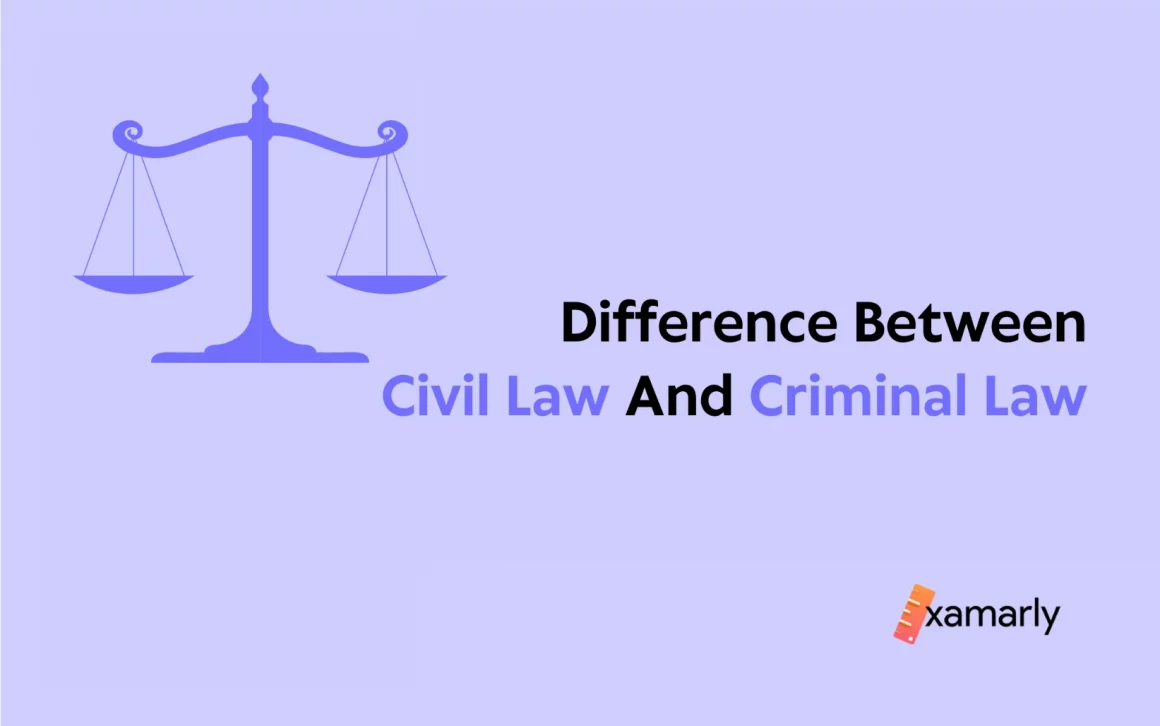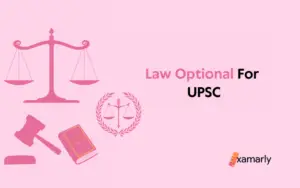Difference Between Civil Law And Criminal Law: The key differences lie in their respective aims, procedures & regulations.
While civil law aims at compensating the victim, criminal law aims at punishing the offender. There are separate lawyers for both these branches of law.
In this article, we’ll have a thorough look on both these branches of law for a better understanding.
- What Is Civil Law?
- Civil Law: Features
- Civil Law: Sub-Categories
- Civil Law: Examples
- Civil Law In India
- Acts Under Civil Law
- What Is Criminal Law?
- Criminal Law: Features
- Criminal Law: Sub-Categories
- Criminal Law: Examples
- Criminal Law In India
- Acts Under Criminal Law
- Difference Between Civil Law And Criminal Law
- Civil Cases And Criminal Cases: When Do They Cross Paths?
- Summary
- FAQs On Difference Between Civil Law And Criminal Law
- What is the main difference between civil law and criminal law?
- Who brings a case in civil law and criminal law?
- What is the burden of proof in civil law and criminal law?
- What are the remedies in civil law and criminal law?
- Can a person be charged with both civil and criminal offenses for the same conduct?
- Can a civil case be appealed and Criminal case too?
- What is the role of the Indian Evidence Act in criminal law?
- Can a person be sentenced in civil law?
What Is Civil Law?
Civil law is a branch of law that deals with disputes between parties(private), such as individuals, businesses, and organizations. It is intended to provide a means for individuals to resolve disputes and seek compensation or remedy for damages or harm suffered.
Civil suits are typically heard in civil courts, as opposed to criminal courts. In civil law cases, the burden of proof falls lower than in criminal law cases, and the standard is typically “preponderance of evidence” meaning that it is more likely than not that the allegations are true.
Civil law also allows for a broader range of remedies, such as monetary damages, injunctions, and specific performance, rather than any punishment or jail time. It is also known as private law, as it deals primarily with private rights and remedies, as opposed to criminal law which deals with public wrongs and penalties imposed by the state.
In civil law, the aggrieved party involved in the case is typically seeking a remedy, such as monetary damages, an injunction, or specific performance of a contract, as opposed to criminal law, which is focused on punishment of the offender.
Civil law is designed to provide a means for individuals to seek compensation or remedy for damages or harm suffered, and to resolve disputes between private parties in a peaceful and orderly manner.
Civil Law: Features
Following are the features of civil law & cases under it:-
- Deals with disputes between private individuals and organizations, rather than criminal offences against society as a whole.
- Designed to protect the rights of individuals and organizations and resolve disputes in a timely and efficient manner.
- Based on the principles of fairness, justice, and the rule of law.
- Cases are usually decided by a judge or a panel of judges, rather than a jury.
- Burden of proof in civil cases is generally lower than in criminal cases, and is often based on a balance of probability.
- Cases are usually initiated by a private party, rather than the government.
- Remedies typically include monetary compensation, rather than imprisonment or fines.
Civil Law: Sub-Categories
Civil law can be divided into several subcategories, each dealing with specific types of disputes or legal issues. Some of the main subcategories of civil law include:
- Contract law: Deals with the formation, performance, and interpretation of contracts between parties. It covers issues such as breach of contract, contract formation, and contract interpretation.
- Tort law: Deals with civil wrongs committed by one party against another, such as negligence, defamation, and strict liability. It provides a means for the aggrieved party to seek compensation for damages or harm suffered as a result of someone else’s actions.
- Property law: Deals with the ownership, possession, and transfer of property. It covers issues such as property rights, property damage & disputes, and real estate transactions.
- Family law: Deals with matters related to marriage, divorce, child custody, and child support.
- Employment law: Deals with disputes and legal issues arising from the relationship between employers and employees.
- Consumer law: Deals with disputes and legal issues arising from consumer transactions, such as disputes over goods or services.
- Administrative law: Deals with disputes and legal issues arising from the actions of administrative agencies and government officials.
- Environmental law: Deals with legal issues related to protection and preservation of the environment.
- Intellectual property law: Deals with disputes and legal issues related to patents, trademarks, copyrights and other forms of intellectual property.
These are some of the main subcategories of civil law, but there are other specialized areas as well.
Civil Law: Examples
Some examples of civil law cases include:-
- Contract disputes: Disputes arising from the performance or interpretation of a contract.
- Personal injury cases: Claims for damages resulting from an injury, such as a car accident.
- Property disputes: Disputes over ownership or possession of property.
- Torts: Civil wrongs committed by one party against another, such as defamation, negligence, or breach of duty.
- Family law: Matters related to marriage, divorce, child custody, and child support.
Civil Law In India
Civil law in India is based on the British common law system and is mainly governed by:-
- The Indian Contract Act of 1872,
- The Indian Evidence Act of 1872, and
- The Indian Limitation Act of 1963.
Civil law in India deals with disputes between individuals, organizations, and the government, and is separate from criminal law, which deals with offenses against society as a whole.
India’s civil law system is based on the principles of fairness, justice, and the rule of law, and is designed to protect the rights of individuals and organizations and resolve disputes in a timely and efficient manner.
Acts Under Civil Law
There are many acts and statutes that govern civil law in India. Some of the main acts and statutes include:
- The Indian Contract Act, 1872: The Indian Contract Act governs the law of contracts in India and sets out the rules for the formation, performance, and enforcement of contracts.
- The Sale of Goods Act, 1930: The Sale of Goods Act governs the law of sale of goods in India and sets out the rights and duties of buyers and sellers of goods.
- The Specific Relief Act, 1963: The Specific Relief Act governs the law of specific performance and sets out the remedies available for breach of contract.
- The Transfer of Property Act, 1882: The Transfer of Property Act governs the law of transfer of property in India and sets out the rules for the transfer of immovable property.
- The Indian Easements Act, 1882: The Indian Easements Act governs the law of easements in India and sets out the rights of a person to use the property of another for a specific purpose.
- The Indian Limitation Act, 1963: The Indian Limitation Act governs the law of limitation in India and sets out the time limits within which a person must bring a legal action.
- The Indian Partnership Act, 1932: The Indian Partnership Act governs the law of partnership in India and sets out the rights and duties of partners in a partnership.
- The Indian Trusts Act, 1882: The Indian Trusts Act governs the law of trusts in India and sets out the rules for the creation and administration of trusts.
- The Consumer Protection Act, 1986: The Consumer Protection Act governs the rights of consumers and sets out the remedies available to consumers in case of any grievance.
- The Indian Arbitration and Conciliation Act, 1996: The Indian Arbitration and Conciliation Act governs the law of arbitration and conciliation in India and sets out the rules for the conduct of arbitral proceedings.
- The Indian Evidence Act, 1872: It lays down the rules of evidence in legal proceedings in India. The Act applies to both civil and criminal cases and sets out the rules for the admissibility of evidence in court.
These are some of the major acts and statutes that govern civil law in India, but it’s important to note that civil laws and penalties may vary depending on the jurisdiction, and it’s always recommended to consult with a legal expert for specific case.
What Is Criminal Law?
Criminal law is a branch of law that deals with crime and the punishment of individuals who have committed crimes. It is intended to protect society by punishing those who violate the law and deterring others from committing similar offenses.
Criminal law cases are typically heard in criminal courts and are governed by criminal procedure rules. In criminal law, the state or government is the party bringing the case against the defendant, who is accused of committing a crime.
The burden of proof in criminal law cases is higher than in civil law cases, and the standard is “beyond a reasonable doubt”, meaning that there must be no other logical explanation for the facts presented in the case other than the defendant’s guilt.
If the defendant is found guilty, they may be subject to penalties such as imprisonment, fines, community service, or even death (in some jurisdictions).
Criminal law covers a wide range of conduct, from minor offenses such as traffic violations to more serious crimes such as murder, manslaughter, and homicide. It also includes property crimes like robbery, theft, and fraud, drug offenses, sexual crimes, and cybercrime.
Criminal law also includes a set of procedural laws that govern the arrest, charging, and trial of criminal defendants. These procedures are designed to protect the rights of defendants and ensure that they receive a fair trial.
Criminal law is an integral part of any society and serves as a means to maintain order and safety by imposing penalties on those who break the criminal laws. It also serves as a deterrent by warning the potential offenders of the consequences of their actions.
Criminal Law: Features
Following are the features of criminal law & cases under it:-
- Deals with offenses against society as a whole, rather than disputes between private individuals or organizations.
- Designed to protect society by punishing those who break the law and deterring others from committing similar offenses.
- Based on the principle of “Innocent until proven guilty”, which means that the accused is considered innocent until proven guilty in a court of law.
- Cases are usually decided by a jury, rather than a judge or panel of judges.
- Burden of proof in criminal cases is higher than in civil cases, and is typically based on beyond reasonable doubt.
- Cases are usually initiated by the government, through a prosecutor or district attorney.
- Remedies typically include imprisonment, fines, or both.
Criminal Law: Sub-Categories
Criminal law can be divided into several subcategories, each dealing with specific types of offenses or legal issues. Some of the main subcategories of criminal law include:
- Violent crimes: This category includes crimes such as murder, manslaughter, and assault, which involve the use of physical force or violence against another person.
- Property crimes: This category includes crimes such as theft, robbery, and burglary, which involve the taking of property without consent.
- White-collar crimes: This category includes non-violent crimes committed by businesses or individuals in a professional or corporate setting, such as fraud, embezzlement, and money laundering.
- Drug offenses: This category includes crimes related to the possession, sale, and distribution of illegal drugs.
- Sexual crimes: This category includes crimes such as rape, sexual assault, and child sexual abuse.
- Cybercrime: This category includes crimes committed using the internet or other forms of technology, such as hacking, identity theft, and online fraud.
- Organized crime: This category includes crimes committed by organized criminal groups, such as racketeering, extortion, and money laundering.
- Terrorism: This category includes crimes committed to intimidate or coerce a civilian population, or to influence the policy of a government by intimidation or coercion.
- Homicide: This category includes the killing of one human being by another, including murder and manslaughter.
These are some of the main subcategories of criminal law, but there are other specialized areas as well.
Criminal Law: Examples
Some examples of criminal offenses include:
- Murder, manslaughter, and homicide.
- Assault and battery.
- Robbery and theft.
- Fraud and white-collar crimes.
- Drug offenses.
- DUI/DWI.
- Sexual crimes such as rape and sexual assault.
- Cybercrime.
- Terrorism.
Criminal Law In India
Criminal law in India is governed by the Indian Penal Code (IPC), which was enacted in 1860. The IPC defines various criminal offenses and the punishments for them. The Code of Criminal Procedure (CrPC) lays down the procedural law for the investigation, prosecution, and trial of criminal offenses in India.
Criminal law in India is designed to protect society by punishing those who break the law and deterring others from committing similar offenses. It is enforced by the police and the criminal justice system, which includes the courts, prosecutors, and correctional institutions.
India also follows the principle of “Innocent until proven guilty”, which means that the accused is considered innocent until proven guilty in the court of law and is protected by the Constitution of India.
Acts Under Criminal Law
There are many acts and statutes that define criminal offenses and the punishments for them under criminal law. Some of the main acts and statutes include:
- Indian Penal Code, 1860 (IPC): The IPC is the main criminal code in India and defines a wide range of criminal offenses, including murder, manslaughter, rape, assault, theft, fraud, extortion, and many others.
- Code of Criminal Procedure, 1973 (CrPC): The CrPC sets out the procedural law for criminal cases in India, including the arrest and bail process, the rights of the accused, and the powers of the police and courts.
- Narcotic Drugs and Psychotropic Substances Act (NDPS): The NDPS Act prohibits the possession, use, sale, and trafficking of drugs and psychotropic substances.
- Prevention of Corruption Act: The Prevention of Corruption Act prohibits public officials from accepting bribes or engaging in corrupt practices.
- Protection of Children from Sexual Offences (POCSO) Act: The POCSO Act prohibits sexual offenses against children and provides for severe punishment for the same.
- Scheduled Castes and Scheduled Tribes (Prevention of Atrocities) Act: The Act prohibits discrimination and violence against scheduled castes and tribes and provides for severe punishment for the same.
- The Unlawful Activities Prevention Act (UAPA): This Act provides for the prevention of unlawful activities associations in India and for dealing with terrorist activities.
- The Arms Act, 1959: The Act provides for the control of the acquisition, possession, and use of arms and ammunition.
- The Prevention of Money Laundering Act (PMLA): The PMLA provides for the prevention of money-laundering and the confiscation of proceeds of crime.
- The Wildlife Protection Act, 1972: The Act provides for the protection of wild animals and plants.
- The Indian Evidence Act, 1872: It lays down the rules of evidence in legal proceedings in India.
These provisions of the Indian Evidence Act provide the framework for the admissibility of evidence in criminal trials in India, and are designed to ensure that the evidence presented in court is reliable, relevant, and admissible under the law.
Difference Between Civil Law And Criminal Law
| Civil Law | Criminal Law |
|---|---|
| Concerned with disputes between individuals and organizations. | Concerned with the prosecution of individuals and organizations for alleged criminal acts. |
| Parties are referred to as “plaintiff” and “defendant”. | Parties are referred to as “prosecutor” and “accused” or “defendant”. |
| Burden of proof is usually on the plaintiff to prove their case by a “preponderance of the evidence”. | Burden of proof is on the prosecution to prove the guilt of the accused beyond a reasonable doubt. |
| Remedies include monetary damages and injunctions. | Remedies include fines, imprisonment, and in some cases, death penalty. |
| Civil cases are brought by private parties or organizations. | Criminal cases are brought by the government. |
| Civil law can be either exercised by state government or federal government. | Criminal law is exercisable by both state as well as federal government. |
| Civil law appeals are to a higher court, generally. | Criminal law appeals are to a higher court and on points of law only. |
| Civil law do not have sentencing. | Criminal laws have sentencing. |
Civil Cases And Criminal Cases: When Do They Cross Paths?
Civil and criminal laws can cross paths in a few different ways. Some examples include:
- Parallel proceedings: In some cases, both civil and criminal actions may be brought against the same individual or organization for the same conduct. For example, if a person is accused of fraud, they may be sued in civil court for monetary damages, and also charged with fraud in criminal court.
- Civil actions arising from criminal conduct: In some cases, a criminal act may give rise to a civil action. For example, if a person is injured in a car accident caused by a drunk driver, the victim may be able to file a civil lawsuit for personal injury damages, in addition to the criminal charges against the driver for driving under the influence.
- Criminal actions arising from civil conduct: In some cases, civil conduct may give rise to criminal charges. For example, a person may be charged with criminal contempt of court for violating a court order in a civil case.
- Civil forfeiture: In certain cases, the state may initiate a civil action to seize property that is believed to be connected to criminal activity, even if the owner of the property has not been charged with a crime.
- White collar crime: White collar crime is a type of crime that is usually committed by businesses, organizations and individuals in their professional capacity. Such crimes include embezzlement, fraud, insider trading, money laundering, and so on. These may be considered both as civil and criminal laws.
It’s important to note that the specific laws and procedures may vary depending on the jurisdiction.
Summary
Civil law and criminal law are two distinct branches of law that deal with different types of legal issues.
Civil law deals with disputes between private parties, such as contract disputes, property disputes, and personal injury cases. Criminal law, on the other hand, deals with crime and the punishment of individuals who have committed crimes.
Civil law typically carries lesser penalties, such as fines or monetary damages, whereas criminal law can carry penalties such as imprisonment or even death.
You Might Also Like To Read:
FAQs On Difference Between Civil Law And Criminal Law
What is the main difference between civil law and criminal law?
The main difference between civil law and criminal law is their purpose. Civil law is concerned with resolving disputes between individuals and organizations, while criminal law is concerned with punishing individuals and organizations for alleged criminal acts.
Who brings a case in civil law and criminal law?
In civil law, cases are brought by private parties or organizations, while in criminal law, cases are brought by the government.
What is the burden of proof in civil law and criminal law?
In civil law, the burden of proof is usually on the plaintiff to prove their case by a “preponderance of the evidence”, while in criminal law, the burden of proof is on the prosecution to prove the guilt of the accused beyond a reasonable doubt.
What are the remedies in civil law and criminal law?
In civil law, remedies include monetary damages and injunctions, while in criminal law, remedies include fines, imprisonment, and in some cases, death penalty.
Can a person be charged with both civil and criminal offenses for the same conduct?
Yes, in some cases, both civil and criminal actions may be brought against the same individual or organization for the same conduct.
Can a civil case be appealed and Criminal case too?
Yes, Civil law appeals are to a higher court, Criminal law appeals are to a higher court and on points of law only.
What is the role of the Indian Evidence Act in criminal law?
The Indian Evidence Act provides the rules and principles governing the admissibility of evidence in criminal trials in India. It lays down guidelines for what evidence can be presented in court, how it should be presented, and how it should be evaluated.
Can a person be sentenced in civil law?
No, Civil law do not have sentencing like criminal law.






